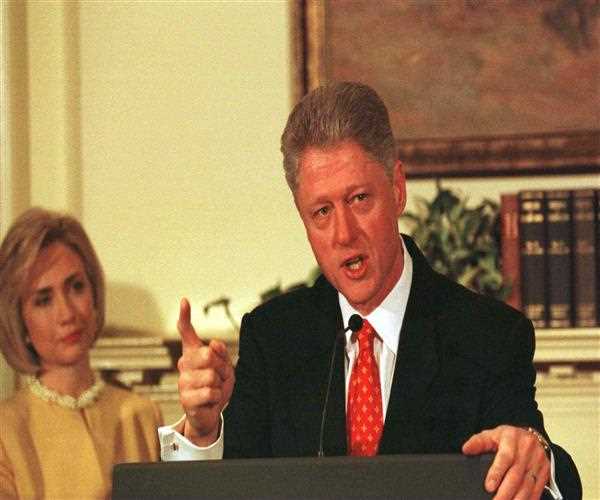William Jefferson Clinton was impugned on charges of prevarication and hindrance of equity today by an isolated House of Representatives, which suggested essentially along partisan principals that the Senate expel the country's 42d President from office.
The man who in better days had talked about where he would remain in the pantheon of American Presidents said he would remain in office and promised ''to go ahead from here to transcend the antipathy, to defeat the agony and division, to be a repairer of the break.''

Mr. Clinton turned out to be just the second President in history to be arraigned, in a staggering day that likewise brought the acquiescence of the approaching Speaker of the House, Robert L. Livingston.
At 1:22 P.M., the House of Representatives endorsed, 228 to 206, the principal article of prosecution, denouncing Mr. Clinton of prevarication for deceiving a Federal great jury last Aug. 17 about the idea of his association with a White House assistant, Monica S. Lewinsky.
In the loud House chamber, a solitary Republican acclaimed. Five Republicans crossed partisan divisions to vote against arraignment. Five Democrats broke with their gathering to help it.
The edge was sufficient to thwart charges that the President's destiny may have been unique if the vote had been postponed to the 106th Congress, which will have five more Democrats.
The second article of an indictment, charging Mr. Clinton with the obstacle of equity, passed on a smaller vote of 221 to 212. It blamed him for prompting others to lie so as to hide his issue with Ms. Lewinsky. This time 12 Republicans voted no, while 5 Democrats voted yes.
''In addition to other things, he promised to God to come clean, every bit of relevant information and only reality, and after that, he neglected to do as such, not once, but rather a few times.'' To overlook this, he stated, is to ''undermine the control of law.''
Two more charges against Mr. Clinton were crushed. An article blaming the President for prevarication in the Paula Jones lewd behavior claim was rejected, 229 to 205, with 28 Republicans breaking positions.
The Senate would lead just the second prosecution preliminary of a President in the 209-year history of the Republic. Mr. Clinton will be the main chose President put on preliminary. Andrew Johnson, indicted and cleared by one vote in 1868, had been chosen Vice President and prevailing to the White House on Abraham Lincoln's death in 1865.
Congressperson Trent Lott of Mississippi, the larger part pioneer, declared soon after the House vote that representatives ''will be set up to satisfy their Constitutional commitments.''
Mr. Lott stated, ''There are steps that go before the start of an indictment preliminary. Once the Senate is sorted out as a prosecution continuing, there will be pleadings and movements that precede the taking of confirmation. That makes it hard to decide right now when a real preliminary will start.''
Hours before Mr. Clinton was arraigned for his endeavors to conceal his issue with Ms. Lewinsky, Mr. Livingston, who had been succeeded Mr. Gingrich, stunned the House by declaring he would leave Congress in light of disclosures of his own two-timing undertakings.
In any case, it was Mr. Livingston today who called for Mr. Clinton's abdication from the House floor. Charging that Mr. Clinton had undermined the control of law and harmed the country, Mr. Livingston stated, ''I say that you have the ability to end that harm and mend the injuries that you have made. You, sir, may leave your post.''